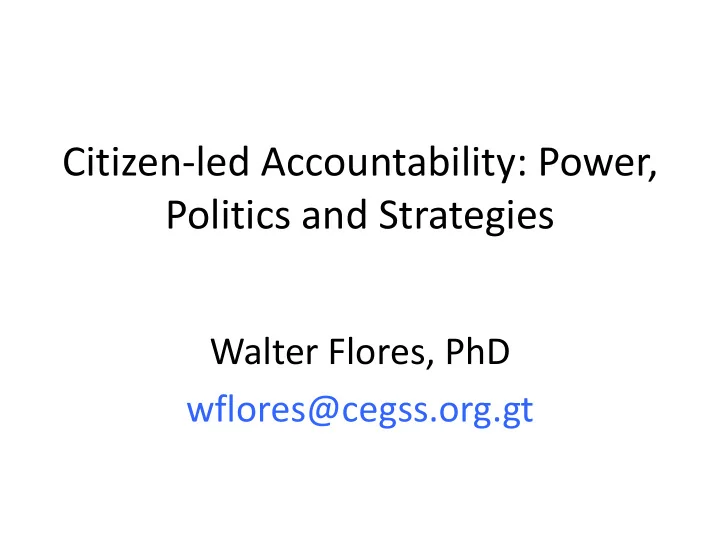

Citizen-led Accountability: Power, Politics and Strategies Walter Flores, PhD wflores@cegss.org.gt
Inequities of power • In addition to disproportionate ill health, avoidable death and poverty, population groups facing inequities are also affected by: – Social exclusion – Marginalization – Rights violations – Attacks to their dignity – Lack of political representation
Holding Governments and Providers to Account • Using the existing legal framework (national and international) • Rights literacy campaigns among population • Capacity building: – To monitor public policies and services and demand accountability from authorities – Strategic advocacy to engage with the State (in addition to health sector, Parliament, Judiciary system, National Ombudsman and others)
From passive users of services to active citizens that demand accountability: examples
Asking medical doctor to sign report Surveying drug availability at a health on shortage of working hours care facility
Interviewing users of services: Did you receive your medicines and vaccines? Did you experience discrimination? Were you asked for illegal payments? etc.
Presenting evidence to Minister, vice-ministers and provincial authorities
What is the approach?
Once critical consciousness is in place (through rights literacy and campaigns), then actions: SMS complaints Referral of AudioVisual cases to Evidence HHRR bodies Engagement with Monitoring resolution authorities at of complaints/service municipal, improvements provincial and national level
Key actors: Right to health Community Defenders
Categories of complaints sent by users • Lack of vaccines and drugs • Lack of equipment and supplies at facilities • Charging patients for services or emergency transport • Selling MoH drugs in private clinics/pharmacies • Denying care based on: ethnicity, gender, lack of documentation • Lack of informed consent • Mistreating users • Insufficient information on diagnosis and treatment • Health facility is closed • Health infrastructure in bad conditions
Public exhibits: evidence of Collecting audiovisual right to health violations evidence
Press conference informing on Presenting audiovisual evidence to collected evidence and demanding authorities action plans to resolve problems
Meeting with Parliamentarians
Results Ethnographic data (2015): – 32 municipalities (of 35) have active channels of engagement with citizens to discuss problems and implement solutions – 20 municipalities are allocating financial resources to improve services – In 15 municipalities, users perceive reduced discrimination and better responsiveness from providers – In 12 municipalities, local authorities are working together with citizens to demand changes at higher level (provincial and national) – Channels of engagement at 5 provincial level As a challenge: many problems are not under control of local authorities and are systemic
Adapting our strategies to power & politics Failed strategy New strategy CEGSS staff advocating for Communities advocating for themselves; travel communities: dismissed by authorities to meet up with authorities at local, provincial as external efforts to create conflict or and national level; learn how to navigate state social unrest apparatus Emphasis on technical arguments: Less emphasis on technical; making visible the probed to be not sufficient to consequences of failing public services upon influence authorities families (life stories); use of audiovisual evidence; Evidence and information conveyed by communities Legitimacy of actors: while raising Communities exercising their power as accountability issues and demands, electorate (municipal and national authorities); CEGSS staff seen as non-legitimate by communities elect representatives to engage authorities (non-indigenous, non- with authorities; CEGSS trains and provides TA elected by indigenous communities to elected community leaders; community and not living in rural areas) mobilization (collective action) to pressure authorities to act
More info at: www.vigilanciaysalud.com www.cegss.org.gt wflores@cegss.org.gt Thanks!
Recommend
More recommend